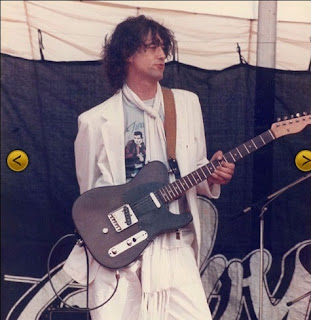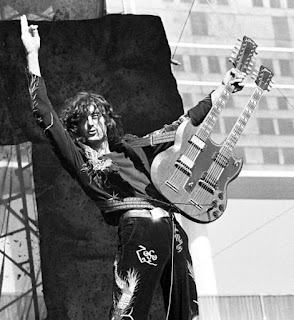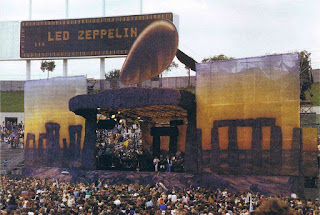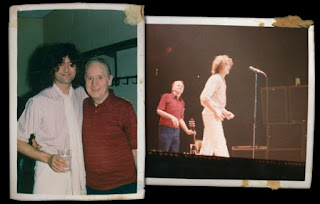Have
sympathy for the devil, for he does not exist...
How many times have you read that rock & roll is
connected with devil worship? How many
times have you read that Stairway to Heaven involves satanic backmasking?* Black magic is scary, isn't it - especially
when it’s the music you love that is delivering the soul-eating content. But, ahem…
I know this will break some hearts and maybe crush a few
cherished beliefs (or fears), but the truth is that there is no such thing as
Black Magick. For that matter, there’s no
such thing as White Magick, either. I
will wait while you wipe the tears from your eyes.
Magick Is Not 'Just Like Magic'
Quite early on I posted that Magick is not about stage shows
or illusion, but rather is about transformation of a Mage’s personal reality
through supernatural means or through knowledge of occult laws. The word “occult” means, among other things, “hidden”. In the case of Magick - although a lot of people like to believe that this means secret - in fact it just refers to the
fact that the unknowable of the infinite is hidden from finite human senses. A Mage
is a person who can access the normally unknowable through use of a process
incorporating desire, focus and ritual.
No tricks, no illusions… just Reality.
How simple it would be if all a would-be Mage had to do was
sell his/her soul to the devil to gain the power of transformation, but alas,
it isn’t so. In fact, Magick turns to
seem an awful lot like <gasp> work.
Yes, Magick is Work
I’m fond of definitions because they help us
to stay on the same page when we're trying to communicate. So
let’s start with the definition of work: "Activity involving
mental or physical effort done in order to achieve a purpose or result”. This is, of course, a human-centric
definition that includes not just the common tasks humans do in everyday life
to bring home the bacon, but also the process and end result of an artist's or
Mage's efforts (e.g. the work of Picasso or Beethoven, the Works of Aleister Crowley). Not only that, but the word is used in
physics to describe the transfer of energy in the known (to humans) universe - and in Magick it describes the same process in the hidden universe.
Work
describes the process of change, regardless of what it is applied to. Work
requires energy - a basic law of the Universe that there is no way
around. It is also a law - and mystery - of the Universe, that although
energy appears to be consumed, it is actually never used up. It only changes form. From the human-centric point of view of life
on this planet it can be said that all things eat, all things are eaten.
Who's doing which matters to individuals involved, but the sum is no energy loss. It takes energy to live - one must eat
to live, to live means to change (for example: repairing, replacing, growing cells),
which means consuming energy. Even the sun consumes energy as it burns its own gasses - but that energy is put out as heat and light. No gain, no loss, just change.
 |
| You are there... somewhere |
In metaphysical
terms - Magick - work is the same. The exchange of
energies obeys the same laws of the Universe. A Mage has the ability to
affect how the energies change in the Universe, and thereby brings about change
in the Mage's reality. The core/central
concept to Magick - and life - is that it is all transformation of energy. In the Big Picture, the Universe knows that everyone who's eating is going to be eaten eventually so it doesn't ultimately matter much about the details. So far, no devil involved here.
You Say Tomatoes, I say …
Bad
boys are not evil boys.
The
notion of good and evil is a human one, used for convenience's sake so we can
make sense of what each other is talking about.
These words are descriptions of our preferences, not about the actual properties
of the things we’re describing. A “good” thing is something a person has
positive feelings about; a “bad” thing is something a person has negative
feelings about. Unfortunately, humans have a tendency to take the descriptors for their internal preferences and
transfer them to external reality. It doesn't make any difference.
A fact of life is that in a zero sum universe everything has a duality about it: What’s
good for one thing may be bad for another. When
a zebra is killed by a pride of lions, it’s “bad” for the zebra but “good” for the
lions because they need to eat. Nothing
lives forever – death is not “bad”, it’s just something humans don’t happen to
like very much, although studies of
Near Death Experiences (NDEs) now challenge
even that point of view.
Human
preferences aside, the change from living to dead, from here to there, from
young to old, from silence to guitar solo is ultimately just work, the change
of form of energy. When Mages change the
nature of their own reality, that’s just work, too, even if we put a capital W on the word. There is no law of the universe, like that of gravity (okay, okay, I know it's all theory) for good and evil. Just look once more at that photo of our small, lonely planet Earth, then turn around and look at the next nebula over. Human preferences only apply when there are humans present. And thus while there is energy throughout the universe, there is no good or evil there. That means that there is nothing intrinsically good or bad
about a Mage's Work since Magick is a process for using the energy of the Universe,
which itself is neither good nor bad – it just is.
Humans: Tool Users
What
Mages or musicians or mathematicians plan to
do with their work is something else entirely. It’s all about
intent, that is, why they
are doing the work and what the desired outcome is. A surgeon uses a knife to slice open a person
to save a life; a murderer uses a knife to take a life. The good or bad is not in the tool but in the
intent of the tool user. The gift of Lucifer
was that of knowledge, symbolized by light. We know Jimmy Page to be a deliberate and exacting musical artist - it can be no accident that he chose The Hermit, bearing light, to
represent him in
The Song Remains The Same. If this isn't a clear message about intent, then what is?
Intent
is part of the Magickal process; the Mage’s intent is what determines the
outcome – and it is up to the individual impacted by it to decide whether it is good or bad, black or white. Devils?
Demons? If they exist at all,
they are the outcome of a Mage’s choice - not the source of the Magick. Angels? Fairies? Beauty, after all, is in the eye of the beholder.
And that, my friends, is why we all should have sympathy for
the devil, for aside from human choice, there is no such thing. Aside from human intention, there is no
evil. There is only energy of the
Universe that Magickal processes use to perform work. Whatever flavor of Magick it might appear to
be, Magick is much, much more than the little labels humans give it.
[Note: Backmasking is a recording technique in which a sound or message is recorded backward to convey a subliminal message. Ironically, Led Zeppelin isn't one of the groups listed as backmasking satanic content in Wikipedia’s list of same. And even more ironically, the one song that is constantly cited for backmasking of satanic content everywhere else is Stairway to Heaven - the only song of Led Zeppelin's other than Houses of the Holy that has anything in its title containing spiritual words (good or evil).]
♪
Future
post: Hmmm. I'm thinking maybe it's time to talk about alchemy. But I might change my mind between now and next week.
♫
This playlist: A little bit of naughty, then to heaven and beyond.
YouTube Playlist - The Devil Made Me Do It
Individual Songs
1969 Led Zeppelin
The Lemon Song (studio) Album: Led Zeppelin II
1975 Led Zeppelin
Custard Pie (studio) Album: Physical Graffiti
1976 Led Zeppelin
For Your Life (studio) Album: Presence
1977 Led Zeppelin
In My Time Of Dying (live) Cleveland
1971 Led Zeppelin
Stairway to Heaven (studio) Album: Led Zeppelin IV
1979 Led Zeppelin
In The Evening (live) Knebworth August 4 1979
(Jimmy Page's every note here seems to be the cry of a living animal!)
1986 The Firm
Dreaming (studio) Album: Mean Business
(I'm not a Paul Rogers fan, but Jimmy Page's guitar work here is a nice close to this sequence of songs)


































